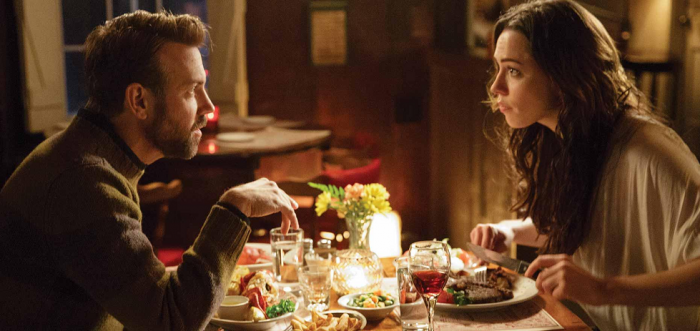
In his latest appearance at the Sydney Writers Festival, art and literary critic Julian Barnes shared some of his reservations about the worship of deceased celebrities. Channeling a bit of John Updike, Barnes lamented the strain in biographical writing that “reduced celebrities to a set of antics and ailments to which we can feel superior”. Barnes’ words serve to be the perfect guide in helping us approach director Sean Mewshaw’s Tumbledown. The film is a restrained examination of both grief and our continued fascination with deceased celebrities, and how the latter invariably debases and devalues the lives of those who knew them as real human beings. It may be presented as a heartfelt romantic comedy, but I can assure you, it’s so much more than that.
The story revolves around the death of fictional folk singer-songwriter Hunter Miles – a kind of messianic figure who died in mysterious circumstances after releasing the “perfect” record. Since his death, Hunter has inspired a grotesque and cultish fandom that sees aspiring folk musicians regularly come to worship his grave, in obvious parallels to real-life artists such as Kurt Cobain and David Foster Wallace. Interestingly, this collaborative effort by director Sean Mewshaw and screenwriter Desiree van Til is not actually concerned with Hunter, but with his grieving widow Hannah (a terrifically nuanced performance by Rebecca Hall). Hannah struggles to properly process the loss of her husband – for her, he was a real person and not a larger-than-life “tortured genius” that the public wants to preserve him as.
Hannah wishes to write a true biography of Hunter; one that would represent the complexities of his personality in a grounded sensibility and serve as a counter-narrative to the grotesque evolution of celebrity that has come to form around him since his death. It is in this process that she meets Andrew McDonnell (Jason Sudeikis), a music academic who also wants to write about the “real” Hunter Miles. Though initially apprehensive of Andrew’s motivations, Hannah realises that Andrew might be able to help her finish the biography she’s been struggling to write for so long. Gradually, Hannah and Andrew bond over memories of Hunter in a small but tight-knit community in rural Maine (near Tumbledown mountain, hence the film’s title), and so begins an unusual love triangle between Hannah, Andrew and the deceased Hunter, whom Hannah is unable to let go of.
This seems like the set-up for a clichéd meet-cute rom-com scenario, but there’s more here than meets the eye. The problem with negligible clichés is not the lack of originality, but the lack of sincerity – when done well and with a committed sensibility, they can actually be enjoyable. Van Til’s script uses the typical meet-cute set-up to genuinely explore feelings of loss, grief and the inability to move on, and the way Mewshaw frames the narrative has dramatic undertones that are revealed more deliberately over time than mainstream rom-coms normally allow. In fact, I’d be hard pressed to call this film a rom-com at all – despite the conventional aspects of the premise, the treatment of the subject matter makes the film closer to a powerful eulogy.
The subtle use of cinematic conventions makes the film alternate rather effortlessly from serious dramatic undertones to overtly funny sensibilities. For instance, the choice of keeping Hunter Miles off screen and building his mythology through the perspectives of all the other characters – such as Blythe Danner, who plays Hannah’s mother, and Joe Manganiello’s Curtis, who is Hannah’s casual booty call – is a framing masterstroke that lends the film much of its dramatic tension and gravitas. Also, Hunter has an omniscient presence that hovers over everyone’s narrative motivations. Damien Jurado writes and sings Hunter’s music, giving him a haunting quality that situates him firmly within this story, while transcending it at the same time.
The film falters when it tries to unnecessarily move away from this central dramatic tension of the narrative – Manganiello’s “rough pretty boy” act does nothing but distract the audience from the narrative’s more nuanced elements, and the presence of Dianna Agron as Andrew’s girlfriend Finley serves only to complicate a narrative that is already quite emotionally laden. It is the lead pair’s earnest performances that keep you engrossed in the story despite these distracting elements. Hall expertly channels a range of emotions to convey her character’s ongoing ordeal, and Sudeikis, who seems to have found a second career as a rom-com star after his delightful portrayal in Sleeping With Other People, is also in top form here. He seems to be tailor-made for the post-modern, post-feminist male lead: acutely self-aware, flawed, yet undeniably witty.
Overall, Tumbledown cleverly uses a conventional genre frame to have a genuine conversation about grief, loss and the grotesque nature of celebrity. It stumbles slightly when the narrative wanders from these dramatic themes into excess, but strong performances from the two leads carry you through a narrative that has a lot more to offer than its premise initially suggests.
